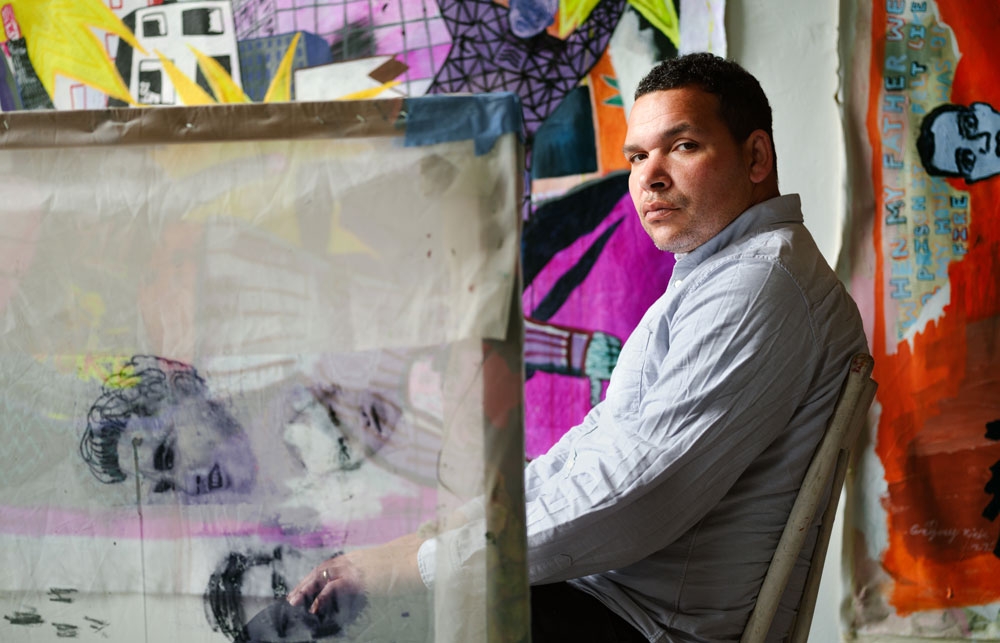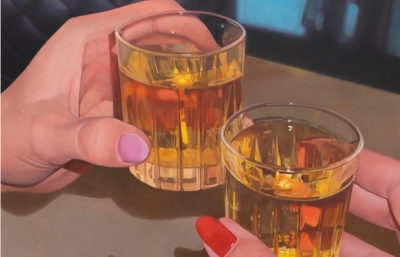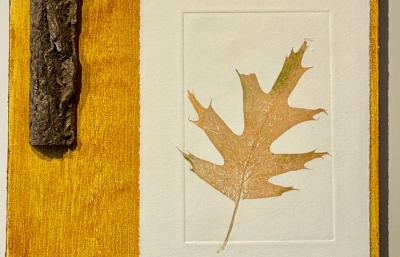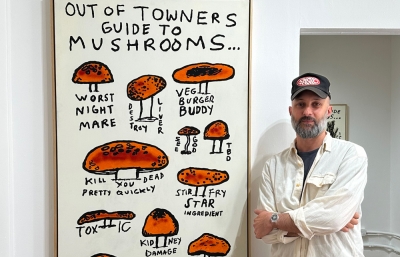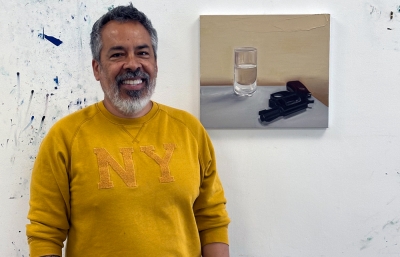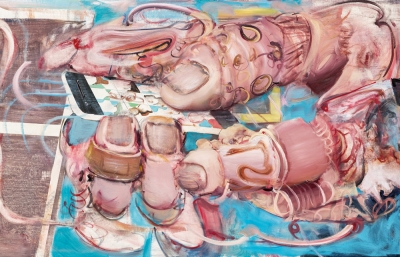Gregory Rick
War and Peace
Interview and portraits by Alex Nicholson
As a young child, Gregory Rick found solace in drawing. It offered both refuge from real-life traumas, and a means of escape, a way of living amidst the challenges. He drew a lot of battle scenes, mostly old military skirmishes he obsessively read about in books, but also imaginary conflicts of the future. Every battle has its tale, and in crafting narratives Rick developed his own ideas about what storytelling was. “It gave me agency,” he says. “I didn’t feel like I had too much power, but I had power over these.”
The lines separating art and life and imagined wars from (very) real ones are more intertwined for Rick than most. In hearing his stories it often feels like real life spilled into his art as much as out of it. We strive to be authors of our own lives but we also play roles in stories over which we have far less control. Art might not be some magical place where all the world’s problems disappear but maybe it can be a safe place to exist with them. And perhaps that’s what we feel when we take notice of a piece of art: a shared sense of existence. It’s, as Rick describes, “a certain… rhythm.”

Alex Nicholson: It was just your birthday!
Gregory Rick: I turned 41, it’s about over, haha!
You're not even halfway there, man!
Shit, I hope so. My mom passed when she was about 49 and then my dad when he was, like, 57, so I hope I can maintain it. Maybe I've had an easier life than they did.
Can you tell me about them? They had pretty rough lives, right?
My dad went to Vietnam and came back pretty strung out. He killed someone and did about ten years. He had demons but loved us fiercely. I used to imagine that the guy he killed was a man that was beating my mother and us. I never got the whole story but I remember my mother picking him up when they were separated and bringing him to the man’s house. Soon after, the abuser was out of our lives. My dad loved us and he would have both killed and died for us.
What was your mom like?
My mom had a bunch of bad boyfriends after my dad. She ended up contracting HIV and eventually cancer, too. She was a generally good, caring person and a real nurturing soul. She was a social worker, and in her limited free time as a single mother with a full-time job, she started a no-kill animal rescue nonprofit. I remember at her funeral one of her colleagues called her “a protector of the voiceless, the children and the animals.” My mom and dad made mistakes but life throws us curve balls. They loved me. I know that.

How old were you when your dad went to prison?
I was really young at the time, maybe seven. This was after already spending a lot of his life in prison. It's how he ended up in Vietnam. It was: go to 'Nam or go to jail. I feel a certain closeness to him. I mean, we share the same birthday and, in a lot of ways, a similar life. I ended up in Iraq because of a similar situation, but with a felony for graffiti.
They expunged it if you enlisted?
First I tried to go on the run for a little bit and went down to Belize and Guatemala. I had just turned 18 and a couple of weeks later caught the charge. I was about 19 when I came back and faced up.
What made you decide to come back?
I just ran out of money, haha. I guess I missed home. The D.A. at the time was Amy Klobuchar. She was in the courtroom laying into me. They were super hardcore about graffiti. The recruiter talked to them and they expunged it so I could bare arms.
And 9/11 happened just before all this?
That was the trifecta of my life. First, my father died. He passed away and then a month or two later I was in Iraq with the 101st Airborne. When we came back for a break, maybe a little over a year later, my mom got really sick with cancer. She ended up passing away right before I got out of the Army. That was a rough, rough, patch for me.

When did you start drawing and being interested in art?
I always drew just as a type of escape. It’s a comfortable spot for me, but it's a pleasure, too, maybe in the same way that some of my friends liked video games. When I was a kid and my dad left, I found myself drawing more, in a way, communicating with him by drawing from these military encyclopedias that were around the house. I think maybe that's where this obsession with the military and guns came from.
Imagining what he had been through?
Maybe, maybe. I don't know. As far as I knew he was the last man that I could think of who loved me, you know? A lot of the guys my mom had around were bad dudes. Some took interest but it was usually to teach me some shit. Like, how to run scams or they would have me help them run scams. Maybe I always associated the military and violence with manhood. I became fascinated with reading about old wars.
Why old wars?
I had this very romanticized idea of battle, European battles specifically, and often those in medieval times. I gravitated more toward infantry and had this idea that this is what being a man meant.
Most young boys are into soldiers and guns though… there is such a fascination with violence.
Maybe I just never really grew out of it. I was really obsessed with war and violence and with guns and the beauty of guns. I would take the Guns Digest and draw every single gun... but it was an escape, too. When I was a kid we were moving all the time. It didn't feel like I had too much power at all. But I had power over these narratives I could create. I was really attracted to this idea of the past. I'd be daydreaming a lot, too, projecting myself into these battles, you know, the Civil War, and really think about what it smelled like or the temperature. Then I would draw them. I felt like that gave me control. Drawing got me through a lot of traumatic experiences and helped me develop my idea of storytelling. It gave me agency.

Did you draw when you were in the Army?
No, I was like, “I can't let these people know I do art. I'm not gonna really draw, I have a real job now…” I would draw secretly, sometimes at night as a means to cope. I created these narratives. It was kind of an internal thing, and that's how it was when I was a kid, too. I only drew a few things while in the military. One of them was a little Virgin Mary, which I put into my helmet, you know. It was gonna protect me and shit. I guess it worked. I made it through, haha.
What was your life like when you got out?
It was back to not really doing shit. I guess I was grieving, there was a lot of trauma. Some of my friends started doing hardcore drugs and I fell into that. I was detached. When I was younger I was trying to be spiritual, but then I started drinking a lot. I think maybe it's in my DNA or something. My dad, my mom, you know… but I was always telling myself I had to change. I started drawing again, and at one point, even had a couple of art shows at coffee shops.
Were your parents religious at all?
I don't think so but my mom would drop me and my brother off at church more as a babysitter than anything else, haha. I think that maybe introduced me to a certain kind of asceticism, a certain understanding of the necessity of hardship. It's something I was into.
You had spent time in the Bay Area on your early graffiti trips, but how did you end up back here?
I came back to Oakland around 2012. I was still borderline strung out. I was painting graffiti and staying in squats and just... broke. One day I was flying a sign and had made enough to get a bag. I gave it to the van and they told me to wait. It was obvious they were going to steal my money, so I thought, “Fuck that,” and jumped through the window. He's driving down the street picking up speed and I'm hanging out fighting over ten or twenty bucks. Finally, I let go. I just sat there. It was raining and I was fucking broke. I was sick. I knew I needed to make some kind of change. It was this seminal point in my life, a kind of crossroads moment. The next day I went to the VA and started going to groups, got some housing, and slowly started to regain my life. I started going to this group where they actually did art.

What was the art group like?
It was only Vietnam vets but they let me in because I was a combat vet and my dad had been in Vietnam. They were all combat vets. We had our own sketchbooks. We drew the traumas or things that were fucking with us and then would leave them on the bookshelf and come back in two weeks and draw some more traumas.
What was it like being the young one there?
I saw my dad in all of them, especially the black guys. I feel like that's always something I was looking for in life. I think that's one of the reasons why I joined the military, too, to learn how to become a man and maybe have a better relationship with my dad. I thought maybe if I was a veteran we'd be on equal terms.
They all had similar stories and somehow these little drawings helped. I got to know them pretty well. They pushed me to do more, jokingly saying things like, "We're gonna beat your ass if you don't use your GI bill!" I enrolled at Berkeley City College thinking I'd be a history major but I had one drawing class and spent more time on that one drawing class than all the others I was taking. Eventually, I started taking all art classes and maybe one history class.
Did you already understand that it could be therapy at that point?
It was something that was articulated. I didn't really realize it at the time, but when I look back now, it's totally what I was doing. It was always my backup if I got nervous or if I got bored, but also if I got inspired.
When did you see that art could maybe be a path you could follow more seriously?
Maybe in grad school at Stanford. I was always kind of teetering on the idea that art isn't a real thing, or that's real. I was mainly engaging with myself or my environment, maybe even community, but not engaging with society, you know?
Not until grad school?
Some teachers at City College suggested I think about going to art school. And then, when I got into CCA I still didn't think I was taking art seriously. I knew it was something I liked to do, it was fulfilling but I have a family I love and support. I needed to make ends meet so I was also fixing toilets. I thought that was going to be what I was going to do for money, be a handyman. Art was really fulfilling, but I didn't see a path except maybe teaching. I had a couple of awards, and teachers were encouraging, which pumped me up some. I applied to Berkeley, Stanford, and Mills. I figured I didn't have a chance but ended up getting into all three!
But you still weren’t sure about it?
Even when I was at Stanford, I thought, “Okay, I could be a teacher. Maybe, maybe I could have some shows too.” Then, in my last year, I started making some breakthroughs in my work. I started finishing paintings. I was winning some wars. Maybe I could actually do this, just art. Or I could be an artist first and a teacher second. I like the idea of teaching now, teachers have helped me a lot and I feel like I should reciprocate.
Can you articulate what it was that clicked?
I started finishing paintings. Some of it was confidence, encouragement from professors, and then last year with the SFMOMA SECA Award. I thought they must have made some kind of mistake! It seemed like I could put more effort into it and not immediately look for other ways to make money.

What do you recognize in a painting to know it's done?
It's gonna sound cheesy, but I feel like the painting just tells you when it's done. It's a certain… rhythm.
What prevented you from finishing them before?
I couldn't resolve them because I was trying to control the painting and it wasn't listening. I was trying to dominate the painting, like, "I'm gonna finish this shit!" I think I just started listening to it more and I developed a system too, like with graffiti.
In what way?
Say you're doing a throw-up. You'll have an initial outline, a sketch, and you fill it in. Then you do the final outline and then maybe a force field or something, and then it's done. I did that shit for, like, twenty years. That was a big part of my life. That was my full-time job for a long time. Painting, stealing, painting, stealing, you know? The other things I did for money were secondary. So I started looking at the process more like graffiti. That just seemed to make more sense to me and made it easier to finish.
It's just something that worked.
I stopped separating fine art and graffiti. I had separated them for a long time. It wasn't even until the final year of undergrad that I started to admit I used to do it. I was able to explore it more as an order of operations I could use for painting. Then there's room for experimentation within those parameters.
Are you surprised at the things that come out in a painting, or are you pretty clear about what you’re going to paint?
I don't know anything. I might start out with an idea, maybe start with a prompt and then work within it to eliminate alternative outcomes. It's always surprising. I'll even sometimes use tools that remove my control from the creation of some of the artwork.
So there is an element of chance?
An element of chance, but maybe an element of collaboration. Something that you can build on.
A collaboration with chance?
Chance and these materials or specific tools that remove my control.
I’ve been drawn to that feeling more and more—the excitement of creating when you don’t know what something will look like and then the surprise of seeing it.
You're setting up the parameters for the surprise to happen. It's not really an experiment, I don't think, because with an experiment you have a desired outcome. It’s a really cool place. It is exciting.

When you struggled to finish paintings was there anything you would do to recall the inspiration? Is there anything you do now?
I think it was a matter of restraint and taking away things, buffing things out, bringing it back to graffiti, and then bringing certain elements back or certain elements forward. It's more discipline to really hold back something to echo something else or to paint over something, even though you like it, to know that the remnant will be underneath, that the history will be underneath and it will inform what's on top. That's something I started thinking about more recently.
Speaking of sounding cheesy, it’s almost like in order to move forward, you have to step back.
I started learning that I can go back, I can go over something. Before my only tool was to just add more, add more, add more, add more, you know? After a while, it's just too much. There's a certain rhythm involved and maybe Beebop works or something like that because of those interludes or those moments of silence or those moments of rhythm between these wild parts.
Do you listen to music when you paint?
No, I don't know why I don't listen to music and paint. I feel like it directs you too much or it's almost like an emotional soundtrack. You're creating a music video and you're acting it out on the canvas.
You’ve experienced a lot of wrenching decisions, ones you’ve made, ones that have been made for you and their consequences. How do you approach them now?
I have a simple answer, something I learned when I was younger. I used to go to this cognitive behavioral therapy-type group and the psychologist would say two things: You should hold on to yourself and others. And also, find out what your morals are, and then stay in line with those. And that's it. It's something that is super easy but super difficult.
And as far as making decisions, you know, you can't really take 'em back, but you can make amends and you can make a different decision if it was the wrong one the first time. All you can do is learn. And maybe that's how you establish your values, by learning from your decisions. But it's gotta rhyme, you know? We're just humans, we’ve only got so many tricks. We have to eat. We strive for certain comforts over and over again. Nothing's unprecedented for the most part. Everything that happens in my life and all the dilemmas are not unique to me. It may be helpful to have some goals and try to align your goals to values as best you can. Not to get all Dr. Phil on you... does that answer the question?

More than answers it. I don't even know what I was looking for with it.
You wanted me to talk about all the bad decisions I made haha.
Haha no, I was just curious about decisions because it can be a struggle! It is for me. What about with creating, decisions you have to make while painting?
I feel like a lot of artists talk about this. Philip Guston said it's the third hand. I have these two hands but there's a third hand that sometimes comes in and makes the painting, finishes it. It’s what we were just talking about. That's a really cool place to be in. Maybe it's easier to come about in dance or something but I feel like painting can be just as physical. I sometimes think painting is kinda like a dance, you know, even though I don't have too much rhythm haha. I can establish a certain rhythm with the marks.
That flow state.
Yeah, like that Jordan fourth-quarter shit. Game seven or game six, where it seems like you tapped into something that's more perfect than all the valuable ideas or self. Something that is in line with what's making my heart beat or my lungs take in this air, blood pumping, these most crucial aspects of me. I don't control any of them. Maybe the best parts of the paintings I didn't have anything to do with.
gregrick.com // This interview was originally published in our Spring 2023 Quarterly

